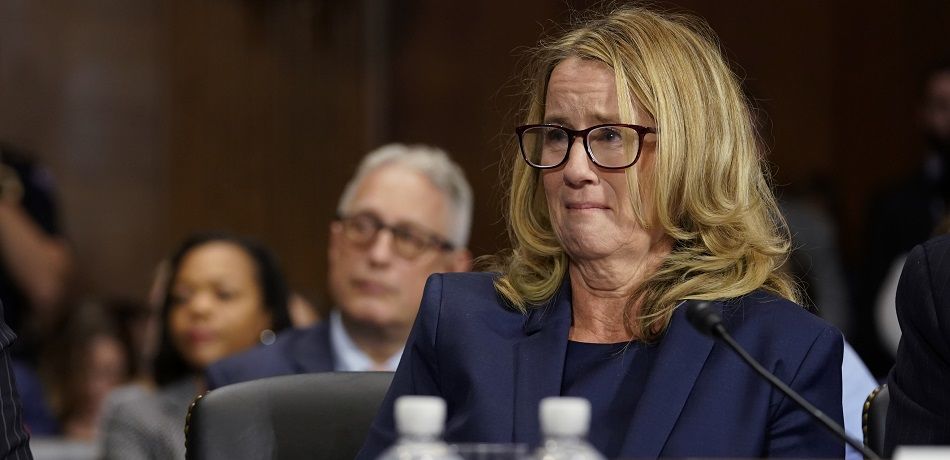Current Events: one clinician’s response to Dr. Christine Blasey-Ford’s sexual assault allegations against recently-confirmed Supreme Court Justice Brett Kavanaugh.
First things first: To sexual assault victims and survivors: we are here for you. We see you. We ache with you. We believe you. To people struggling with substance use and addiction: we are here for you too. We see you. We understand the complexity associated with substance use.
Sexual assault is one of the most prevalent and underreported experiences people of all genders experience today. It’s important to note that current statistics show that women* are grossly more impacted by sexual assault than men*; and while the debate about whether this data is appropriately inclusive in its representation is important, it is not the main focus of this piece. We know that sexual assault knows no boundaries; it can happen to and be perpetrated by people of any sex, gender, orientation, or identity.
A brief disclosure
I write this post as a clinical social worker who has experience working with survivors of multiple forms of violence. I write this post as a queer woman, as a person impacted by substance use, and as a person who identifies with the #metoo movement. I write this piece as a person who has loved and provided care for the perpetrators of violence – both in my personal life and in my work.
I write this post because, over the last month, three women have openly accused one very powerful, now famous man of sexual assault. Brett Kavanaugh is also being accused of decades of binge-drinking behavior that reportedly often ended in verbal and physical violence. Despite reports from friends, he denies all accusations of violence and denies ever blacking out from binge drinking. He has also studied, worked, and networked his way to a confirmation to the U.S. Supreme Court.
This is a highly politicized and polarized time in our nation’s history. The impact that current events like this have on our relationships and our mental health is not easily ignored, even though we may often feel numb to it all. The intention of this piece is to acknowledge the complexity of themes, feelings, and responses associated with this confirmation process. It is also meant as an invitation to consider what impact these themes have in your life and to offer space in which we can talk about the impact these events are having on ourselves and our relationships.
The importance of being “seen” and believed when reporting a traumatic event
In her seminal book Trauma and Recovery, renowned trauma therapist and researcher Dr. Judith Herman wrote that “[…]traumatic events are extraordinary not because they occur rarely, but rather because… they overwhelm the ordinary systems of care that give people a sense of control, connection, and meaning.”
When trauma occurs, especially early in our development, we often lose something essential that prevents us from developing key aspects of ourselves: a sense of self-esteem, agency in our own lives, and a sense of belonging in relationships. Experiencing trauma impacts our own sense of being worthy and our sense of ourselves as cohesive, whole, worthwhile people with the power to tell our stories and the confidence that we will be seen as the complex people that all human beings are.
Unfortunately, as Dr. Herman demonstrates, traumatic events are not uncommon. Many people have endured numerous experiences of trauma throughout their lifetime, but there is a gap between people who experience trauma and people who go on to develop symptoms congruent with post-traumatic stress. Notably, the large majority of people who feel unable to share experiences of victimization and survival in a way that is met with compassion, acceptance, and other resources go on to develop symptoms congruent with trauma-related disorders, including post-traumatic stress disorder.
Many factors contribute to the polarization between transparency and secrecy. Often, people do not report experiences of trauma because they are fearful that they will not be believed. They are fearful that they would be blamed for someone else’s coercive actions and they are fearful that they would be viewed as bad and unloveable – or, in other words, somehow deserving of the coercive action of another, whether that action is sexual, verbal, emotional, social, spiritual, or economic in nature. Time and time again, people turn to immensely creative ways to try and attend to their suffering without burdening others or out of fear that they would be “other-ed,” ostracized, or banished from their family, core group friends, or their community.

Remarkably, in cases where a person may develop symptoms congruent with post-traumatic stress disorder, borderline personality disorder, or other symptoms/disorders associated with post-traumatic stress, the likelihood of these symptoms developing into a full-blown disorder is not necessarily due only to the event itself but rather to how a person’s community responds to them in the aftermath of their experience.
Think about that. The response to a traumatic experience is perhaps more influential than the experience of the event itself in determining whether a person goes on to develop a trauma-related disorder. When a person is met with compassion – a sense of being believed, of being seen and heard, and of being worthy of being believed, seen, and heard – they can see that they are still worthy of love and belonging. They can see that what’s happened to them does not have to define them. From there, a path toward processing what happened and healing can truly begin. In the absence of a compassionate response – when we are blamed for or denied the truth of our own experiences – the person impacted by the traumatic event (victim or survivor) often takes on beliefs about themselves that make what happened to them feel more “digestible” or understandable.
For example, someone is told that she was “asking for it” because of the outfit she chose to wear to a party where she was sexually assaulted, it becomes extremely difficult for that person to not take on that belief. She begins to accept blame for her own role in the traumatic event despite the fact that it was caused by someone else’s inability to control themselves. In other words, what often happens is that she begins to feel shame; she begins to feel like she is bad, defective, like she cannot trust her own judgments, and like she is somehow responsible for the actions of another.
In some ways, these beliefs are protective in nature – it gives back a sense of control over the situation. Isn’t it even a little bit more tolerable to “know” – or take on the belief – that you are bad, defective, and “responsible” for the actions of others instead of accepting that there are people and situations over which we are powerless and vulnerable? Isn’t it easier to tell yourself those things before others tell you that first? For many, the answer is “yes”, despite the fact that those beliefs, while borne of a protective response to traumatic experiences, can cause long-term immense suffering.
One of the hallmark symptoms associated with post-traumatic stress is avoidance – particularly avoidance of people and places that the survivor associates with the event. In her testimony two weeks ago, Dr. Christine Blasey Ford describes one of the most distressing symptoms associated with her post-traumatic stress as the sound of Kavanaugh and his friend, Mark Judge, laughing as they acted upon her as if she was an object for their mutual pleasure and objectification instead of another worthwhile human being in the room. The nuanced neuroscience behind this trigger is for another post, but the point is this: not speaking up about this experience is congruent with the traumatic nature of the event itself. The avoidance is protection. The secrecy keeps her safe. To think about it, and to have to listen to his response, requires that Dr. Ford allows these memories to arise, consciously, and tolerate their impact, likely at a great emotional expense.
Knowing this, is it any wonder that Dr. Christine Blasey Ford did not disclose this sexual assault earlier?
The importance of recognizing shame associated with substance misuse
And so: what can we make of Kavanaugh’s emotionally volatile response to Dr. Ford’s testimony? Speaking just for myself, there were parts of me that felt shocked at Kavanaugh’s belligerence on full display as he responded to Dr. Ford’s allegations against him. As a female-identified person, I was struck at the double standard between how men and women are “allowed” to behave. I wondered how our collective response would have been different if Dr. Ford had shouted, screamed, cried, and admonished the senators and her accused perpetrator in a similar fashion to Kavanaugh.

At the same time, that belligerence – the vehemently protective response – was familiar to me from my work with people struggling with substance misuse. One of the most common, quick tests for alcohol use disorders is the CAGE questionnaire. It is a simple screening tool to identify potential problems with alcohol. The “A” in the acronym refers to whether annoyance is expressed when someone questions your drinking. In many ways, it felt like both Kavanaugh’s behavior toward Dr. Ford and his relationship to beer were on trial; and the scrutiny of his sexual conduct and his drinking habits felt intolerable to him.
In many ways, people often turn to substance use as a creative, convenient, and – this is essential – effective way to alleviate stress, anxiety, inadequacy, shyness, shame.
Alcohol, opiates, stimulants, marijuana, and even hallucinogens to some extent, provide an opportunity to rest, however briefly, in an altered state that feels different than how we may otherwise typically feel. People use drugs and alcohol for a variety of reasons. Some use out of pure curiosity and others for spiritual transcendence. Others still use because of social pressure and many use because they are trying to shift away from an emotional state that feels intolerable: pain, grief, loneliness, terror, shame. The entry-and-exit- stories into each particular drug category is often as varied as the variety of people who use drugs and alcohol. Because of that, and because of the information presented to us during the course of his confirmation hearings, I am curious about the role substance use plays in Kavanaugh’s life.
Based on feedback from his friends and people who were a part of his social circles, whether at school or beyond, it seems reasonable to accept that Kavanaugh began to drink heavily during late-adolescence and early adulthood. Binge drinking is defined as “the consumption of an excessive amount of alcohol in a short period of time.” I would expand the definition to include an acknowledgment that binge-drinking often results in short-term memory loss and behavior that may be incongruent with one’s values or preferred way of being when not intoxicated. The threshold for binge drinking is 4-standard drinks (e.g. a twelve oz beer at 5% alcohol) for men. For more on the phenomenon of binge-drinking and blackout, check out a recent blog post from NPRHealth: You Don’t Need to be Passed-out to be Blackout Drunk.
When we are accused of something that we may not remember, it can feel almost impossible to be held accountable for that behavior. Often, shame and anger arise when someone else is insisting on something that we have done but don’t remember; we have no template upon which to map or understand that experience because the memory is not encoded in our long-term memory and is not retrievable. Again, the neuroscience behind the impact alcohol has on memory is for another post. The point is: it feels reasonable to attribute Kavanaugh’s belligerence during his nomination to, in part, a combination of fear and shame. Fear – of losing an opportunity he felt entitled to based upon a combination of his record, nomination, work, and unearned privileges associated with being a wealthy, white, straight, man in our society; Shame – of losing his reputation to an event that may have had very little impact on his own life, that he might not remember due to issues of long-term memory consolidation associated with binge drinking, OR – and this may be the hardest to digest – that had been fun, exciting and exactly what he and his friend Mark Judge had wanted to do, and were conscious of at the time, fueled by the powerful influence of too much alcohol.
We simply don’t know, and not knowing with certainty is hard.
In addition to the shock and disappointment that I felt while watching Kavanaugh’s testimony two weeks ago, I also felt grief. What if we lived in a culture where Kavanaugh felt he could be more open and transparent about his alcohol use without terror of losing his job, reputation, and peer group? What if he is struggling with an alcohol use disorder? Will his experience during this testimony contribute to his willingness to admit he has – or had – a problem? Or will it amplify shame and drive him deeper into protecting himself “at all costs?” What impact will this experience have on his ability to serve as one of our Supreme Court justices? He says “none,” but such a black and white response is simply not realistic or credible.
Being seen is the antidote
Writer Johann Hari states that the opposite of addiction is not necessarily sobriety but connection. I would go further than that and pose that the opposite of addiction is a safe connection – safe connection to yourself in addition to safe connection to other people. Safe connection includes the same principles required to mitigate the development of symptoms congruent with post-traumatic stress disorder(s): compassion, a feeling of being seen and known and accepted for all aspects of who we are. We are all comprised of the good and the bad, the beautiful and the ugly, the comforting and the cringe-worthy, the hopeful and the despairing, the parts that engage in high-risk behavior – including substance use – and the parts that want to heal traumatic wounds.
Dr. Judy Herman also wrote that though we may be broken in relationships, we are also healed in relationships.
Our work here at PsychGarden is to provide you with an opportunity to connect with another person who will believe that you are suffering. We will express curiosity about what has happened to you that contributes to this suffering, and we will believe you. We will meet you where you are in your own process of healing and recovery. We will express curiosity about how you attempt to cope with this suffering. We will work with you to help you identify whether your life is being negatively impacted by symptoms congruent with post-traumatic stress and/or substance use, and we will work with you to support you in deciding whether, and how to, continue to use your substance(s) of choice or to stop, depending on your goals. We will always work with you toward mitigating risk and reducing harm, and we are committed to working toward rebuilding a sense of trust in yourself and in your relationship with others whether through social action, internal exploration, or both.
Our main goal is to meet you where you are and to be in a relationship with you there. Another one of our goals is to promote qualities that are the antithesis of interpersonal trauma: to promote choice, collaboration, and safe-connection as you face decisions about how you want to reduce suffering within yourself and within your relationships.
- Cis-gender – someone whose gender identity matches their anatomical sex at birth
- Trans* – an umbrella term referring to anyone who does not identify as cis-gender;
- women/men*– for the purpose of this piece is being defined as cis-women and men because most statistics do not have strong data representing queer/trans-women and/or men.
Resources for sexual assault, domestic violence, suicide, and substance use:
- Boston Area Rape Crisis Center (BARCC)
- The Network LaRed (LGBTQ-focused/friendly)
- REACH-Beyond Domestic Violence
- Suicide Prevention and Support (Samartines)
- MA Substance Use Helpline (call for referrals to treatment and help navigating the system)

